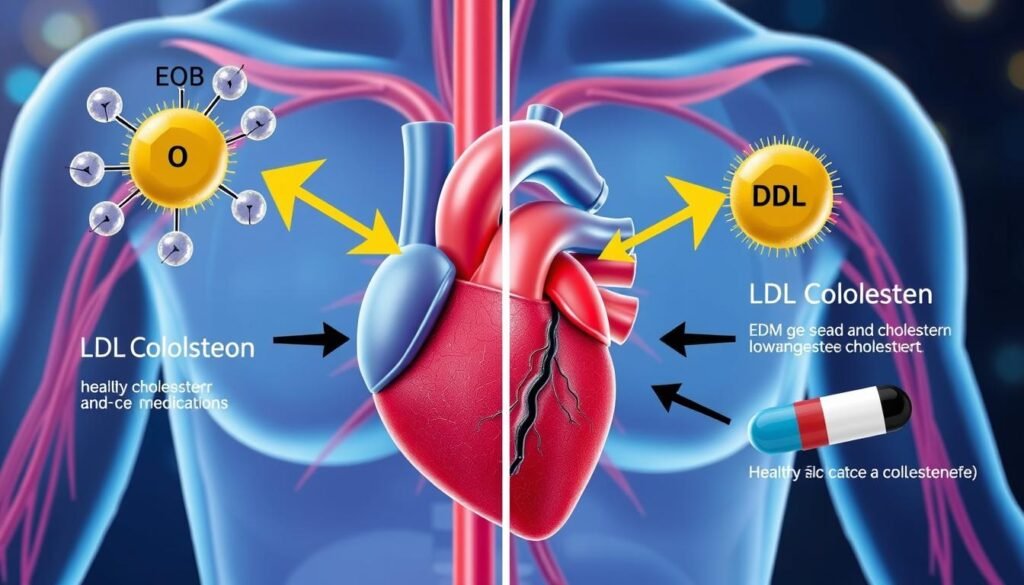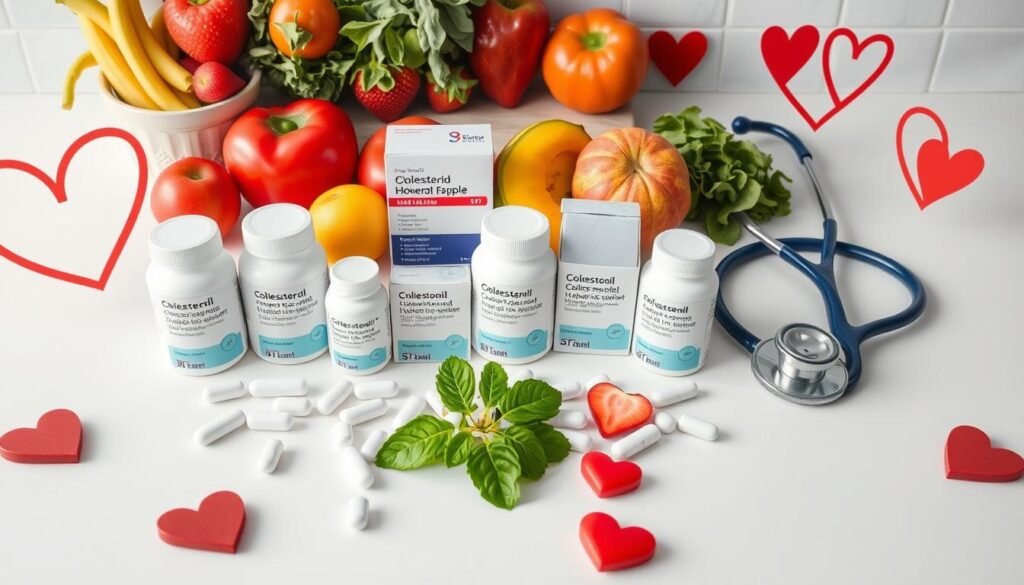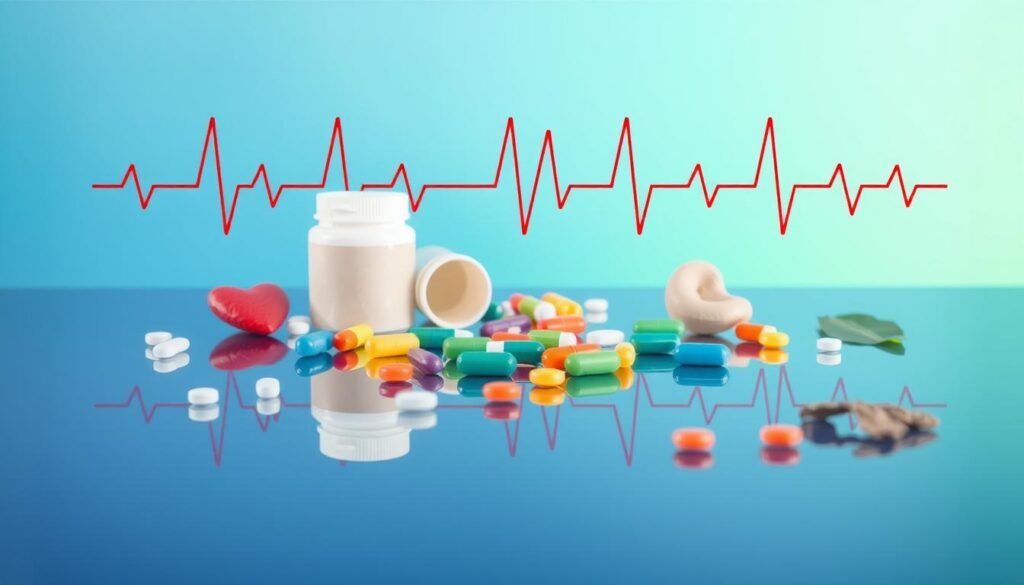It’s eye-opening to know that about 95 million U.S. adults have high cholesterol. Their levels are above the safe limit of 200 milligrams per deciliter (mg/dL). This fact highlights the critical need for cholesterol-lowering medications, especially statins. These drugs work well to cut down heart attack and stroke risks. Yet, many still wonder about their safety. How do the benefits weigh against the side effects?
This piece takes a closer look at cholesterol-lowering meds. We’ll see how they work, the right candidates for them, and what they offer in terms of risks and rewards. Groups like the American Heart Association and the FDA back ongoing discussions on managing cholesterol. Making informed choices about statins and other options is vital.
Key Takeaways
- Most adults should maintain total cholesterol levels below 200 mg/dL to promote cardiovascular health.
- Statin drugs are often prescribed to lower low-density lipoprotein (LDL) cholesterol and reduce the risk of heart disease.
- Patients may experience side effects from statins, including muscle pain and a slight increase in blood sugar levels.
- Guidelines suggest that specific populations, such as those aged 40 to 75 with heart disease risk factors, should consider statin therapy.
- Understanding individual risk factors plays a crucial role in the decision to initiate cholesterol-lowering medications.
Introduction to Cholesterol-Lowering Medications
Cholesterol-lowering medications are key in managing blood cholesterol levels. They aim to lower “bad” cholesterol, or LDL, and triglycerides. High levels of these can lead to heart problems. These drugs help people get healthier when changes in diet or exercise aren’t enough.
There are many types of these medications, each working differently. For example, statins like Atorvastatin lower LDL by up to 60%. There are also bile acid sequestrants and PCSK9 inhibitors. These offer different ways to manage lipid management.
Keeping blood cholesterol levels low is crucial. High cholesterol can cause plaque build-up in arteries, raising heart attack and stroke risks. These medications are essential for those who can’t lower cholesterol with lifestyle alone. Doctors use them along with other strategies for better heart health.
Using these medications and changing lifestyle habits offer the best results. Regular talks with healthcare providers help patients understand their options. This way, they can manage their treatment plans effectively.
The Role of Statins in Lipid Management
Statins are key in managing cholesterol and boosting heart health. They work by blocking a liver enzyme. This lowers the LDL cholesterol in our blood. High LDL cholesterol levels can lead to heart disease and strokes.
In the US, there are many FDA-approved statins like atorvastatin (Lipitor) and rosuvastatin (Crestor). These drugs come in different strengths for various conditions. They help adults and kids by preventing heart diseases caused by cholesterol.
Statins not only lower LDL cholesterol but also fight inflammation and act as antioxidants. Depending on their strength, statins can reduce LDL cholesterol significantly. High-intensity statins can lower it by more than 50%.
The American Heart Association and the American College of Cardiology suggest doses for each statin type. This helps doctors give the right statin dose to each patient. High-risk patients may need stronger statins to protect their hearts.
In summary, statins are crucial for controlling LDL cholesterol and protecting the heart. There are many statin options that doctors can choose from. This helps patients get the care they need for a healthier future.
How Cholesterol-Lowering Medications Work
It’s important to know how cholesterol-lowering medications work if you have high cholesterol. Statin drugs are key in tackling this issue. They work by blocking a specific enzyme in your liver. This enzyme is crucial for making cholesterol. That way, statins can cut down bad cholesterol (LDL) by more than 50%. This greatly helps protect your heart.
Besides lowering LDL cholesterol, statins can also lower triglycerides. Sometimes, they even raise good cholesterol (HDL). This helps in managing a healthy lipid profile. It also lowers the risk of heart attack and stroke. Today, around 92 million adults in the U.S. use statin drugs. This shows how common they are in fighting high cholesterol.
In the battle against cholesterol, statins are not alone. There are other types of medicines that help too:
- Bile acid sequestrants: These drugs remove bile acids, which takes cholesterol out of your blood.
- Niacin: This B vitamin improves your lipid levels. It lowers both total cholesterol and triglycerides.
- Fibrates: These mainly cut down on triglycerides. At the same time, they can increase HDL cholesterol.
- PCSK9 inhibitors: For people with a specific genetic condition, these injections dramatically lower LDL cholesterol.
Keeping in touch with your doctor and regular check-ups are key. They help manage cholesterol and medication side effects well. Knowing how different cholesterol medicines work helps you make better choices for your heart health.

Benefits of Cholesterol-Lowering Medications
Cholesterol-lowering medications, like statins, are key for people trying to control cholesterol and lessen heart disease risks. Knowing the benefits of cholesterol-lowering medications is key for those at risk of heart problems.
Reducing Cardiovascular Disease Risks
Statins are effective in lowering heart attack and stroke risks. Research shows they significantly reduce these dangers. They cut down heart attack chances by 23% and stroke risks by 17%. These meds are especially helpful for those with heart conditions or high risk.
It’s important to talk with healthcare providers regularly. They help tailor treatments, combining lifestyle changes and medications into a personal health plan.
Lowering LDL and Triglycerides
Statins decrease “bad cholesterol” (LDL) by up to 50%. They also lower triglycerides for better heart health. Keeping track of cholesterol is crucial on statins, as their benefits stop if you quit them. Long-term commitment is essential even if cholesterol levels seem normal.
Along with meds, adopting a healthy lifestyle is key. It’s vital for managing lipids and reducing heart disease risks.

| Statin | LDL Reduction | Trisglycerides Reduction | Cardiovascular Event Reduction |
|---|---|---|---|
| Atorvastatin (Lipitor) | Up to 50% | Moderate | 23% reduction in heart attacks |
| Rosuvastatin (Crestor) | Up to 50% | High | 19% reduction in cardiovascular death |
| Simvastatin (Zocor) | Up to 35% | Moderate | 12% reduction in all-cause mortality |
Overall, the impact of statins in fighting cardiovascular diseases and managing cholesterol is huge.
Cholesterol-Lowering Medications Safe? Examining the Risks
Evaluating cholesterol-lowering medications, especially statins, is vital. Their safety profile tends to be strong. Yet, knowing the potential side effects is key for patient care. Here are the side effects some users of statins have reported.
Common Side Effects of Statin Drugs
Statin drugs usually cause no problems, but some folks might have side effects. Here are some common ones:
- Muscle Pain: A common issue with statins.
- Digestive Problems: Symptoms include nausea and bloating.
- Liver Damage: This is rare, happening in ≤2 out of a million patients a year.
- Cognitive Issues: Some may have reversible memory loss.
- Increased Blood Sugar Levels: This could lead to a diabetes diagnosis for some.
Potential for Muscle Pain and Damage
Muscle pain from statins worries many. Though muscle side effects are possible, severe damage isn’t common. Knowing why this pain happens can help ease concerns. Severe muscle problems are actually quite rare.
The “nocebo” effect might make some think they’re having side effects. Understanding statins’ benefits can help. It shows they decrease heart risk and helps people not worry about muscle pain too much.

Doctors now say routine tests for liver health on statins aren’t needed. This suggests serious liver issues are rare. If you notice any side effects, talking to your doctor is important. This helps customize your cholesterol treatment.
| Side Effect | Frequency | Notes |
|---|---|---|
| Muscle Pain | Common | Usually manageable; severe damage rare. |
| Digestive Problems | Common | Often transient; contact a physician if persistent. |
| Liver Damage | Very Rare | Reporting rate ≤2 per million patient-years. |
| Cognitive Issues | Occasional | Generally reversible; monitor with a healthcare provider. |
| Increased Blood Sugar | Occasional | May lead to earlier diabetes diagnosis in at-risk individuals. |
Who Should Consider Cholesterol-Lowering Medications?
Statins, important for heart health, help many people. It’s key to know who needs these meds. This is based on risk and guidelines for prescription.
Assessing Individual Risk Factors
Several factors can make you think about taking statins:
- Being older
- Having diabetes, which ups your heart risk
- A family history of heart trouble
- High LDL cholesterol, over 190 mg/dL
- High triglycerides, more than 200 mg/dL
Those facing higher risks may need statins. Checking your cholesterol is key to see if you need them.
People with diabetes are way more likely to have heart problems. It’s crucial to manage cholesterol well. To learn when you might need these meds, check out this guide.
Guidelines for Prescription
Adults between 40 and 75 with major risk factors should talk about these meds often. These chats should focus on the patient’s risk of heart events. A risk score over 5% means meds might be needed. This score helps find the best treatment for each person.
Statins, like atorvastatin (Lipitor) and rosuvastatin (Crestor), are go-tos for stopping artery plaque. For more about cholesterol and heart risks, visit this site.
Managing Side Effects While on Cholesterol-Lowering Medications
Cholesterol medications like statins bring big health perks but sometimes cause side effects. It’s key to deal with these issues for the patient’s health and happiness. Knowing how to lessen these reactions is crucial for anyone on these meds.
Strategies to Minimize Adverse Reactions
There are ways to handle side effects from cholesterol meds. Let’s look at some:
- Adjusting the dosage: A smaller dose might lessen muscle pain but still help the heart.
- Considering a “statin vacation”: Taking a break from the drug for a few weeks can cut down on muscle aches. This pause lets the body reset.
- Switching medications: If problems don’t go away, trying a different statin or a new type of cholesterol drug, like Ezetimibe or PCSK9 inhibitors, might work.
- Monitoring interactions: Staying away from certain foods, like grapefruit juice, and being careful with other meds can prevent negative reactions.
Importance of Ongoing Communication with Healthcare Professionals
Talking regularly with health pros is essential in dealing with side effects. Check-ins let patients share new symptoms or worries, leading to better treatment plans. Feeling free to talk about side effects helps doctors individualize care. Using tools like the Yellow Card Scheme to report issues ensures safer treatment. This open talk makes care better for everyone.
| Strategy | Description |
|---|---|
| Adjusting dosage | Lower doses can reduce symptoms while maintaining effectiveness. |
| Statin vacation | Taking a break from medication can alleviate muscle pain. |
| Switching medications | Alternatives may provide relief while maintaining lipid control. |
| Monitoring interactions | Avoiding certain foods and drugs can help prevent side effects. |
Alternative Cholesterol-Lowering Treatments
Those needing to manage their cholesterol have many options beyond statins. Alternative Cholesterol-Lowering Treatments are key for people who can’t take statins or want better lipid control. Both Non-Statin Options and lifestyle adjustments are vital for managing cholesterol well.
Non-Statin Options
Many non-statin drugs can lower LDL cholesterol effectively. PCSK9 inhibitors like evolocumab (Repatha) and alirocumab (Praluent) are a good example. They have been shown to cut LDL cholesterol by as much as 60% and reduce heart disease risk by around 15%.
| Medication | Type | Potential LDL Reduction | Cost Range (Retail) |
|---|---|---|---|
| Ezetimibe | Cholesterol Absorption Inhibitor | 10-20% | $176.89 – $768.99 |
| PCSK9 Inhibitors | Injectable | Up to 60% | $4,200 – $5,000/year |
| Bempedoic Acid (Nexletol) | ACL Inhibitor | Up to 20% | $300/month |
Natural options also help with cholesterol management. Phytosterols, omega-3 fats, and soluble fiber are beneficial. Phytosterols can reduce LDL cholesterol by 6-12% in four weeks. Also, 3.5 grams of beta-glucan from oats can lower bad cholesterol by 4.2% over time.
Lifestyle Changes for Better Lipid Management
Lifestyle changes are crucial in controlling cholesterol. Eating more fruits, vegetables, whole grains, and lean proteins is good for your heart.
- Incorporate more fiber: Foods like oat bran, apples, and beans help lower LDL cholesterol.
- Opt for healthy fats: Omega-3-rich foods like salmon, mackerel, walnuts, and flaxseeds are great for your heart.
- Stay active: Doing moderate exercise for at least 150 minutes a week boosts HDL cholesterol and lowers LDL.
- Avoid tobacco and minimize alcohol: These are important for heart health and maintaining good cholesterol levels.
Mixing these lifestyle changes with Non-Statin Options offers a full plan for better cholesterol management and heart disease risk reduction.
Conclusion
The research into the safety of cholesterol-lowering drugs shows a complex picture. It highlights both the good and bad sides. Lowering LDL cholesterol is crucial for heart health. Studies like the Framingham cohort show this. Statins are particularly good at reducing LDL levels. This helps decrease major heart problems. This info is vital for those thinking about cholesterol management.
Statins can significantly lower LDL cholesterol, from about 25% with pravastatin and simvastatin to 50% with atorvastatin and rosuvastatin. But, it’s important to think about the side effects too. Muscle pain and other effects point to the need for a custom plan for using these drugs.
People with high cholesterol should talk to doctors to make a personalized plan. They should mix medicine use with lifestyle changes like exercise and a good diet. This way, they can manage their cholesterol well and improve their heart health. Being informed and active in their health decisions is crucial. This makes sure that cholesterol-lowering drugs stay a safe and helpful part of their care.